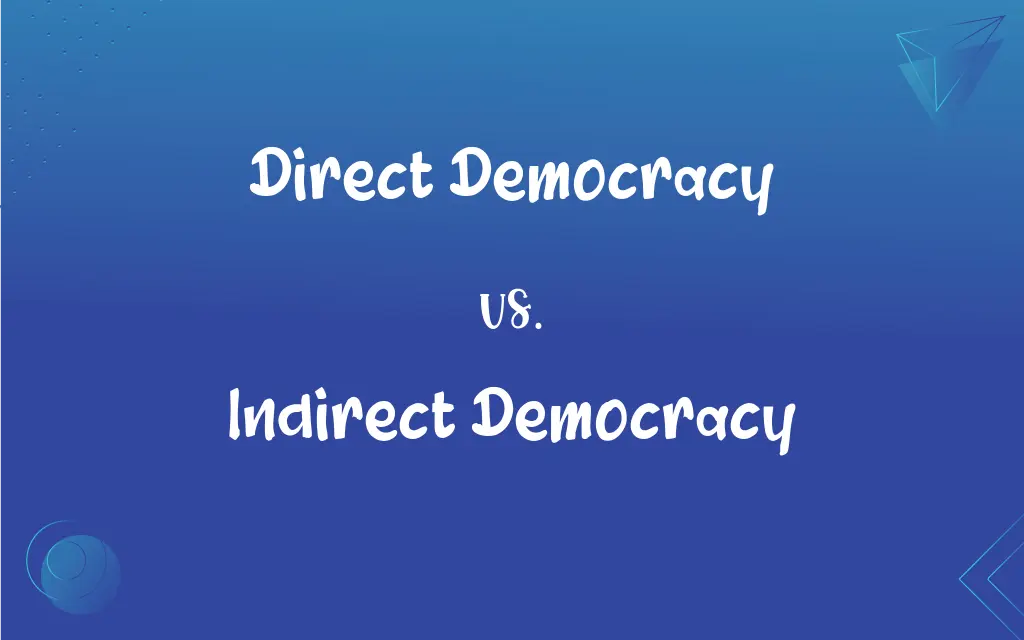Direct Democracy vs. Indirect Democracy: What's the Difference?
Edited by Aimie Carlson || By Harlon Moss || Updated on October 9, 2023
Direct Democracy is a form of government where citizens vote on laws directly. Indirect Democracy is a system where citizens elect representatives to make laws on their behalf.

Key Differences
In Direct Democracy, citizens themselves enact and formulate the policies, laws, and governing strategies of their country. This can be seen as a hands-on approach where every individual's opinion can be articulated through their vote. The public has the right to participate in decision-making processes that mold the functioning and future of their state. Ancient Athens is often cited as an exemplar of direct democracy where citizens actively engaged in debates and voting.
On the contrary, Indirect Democracy, often synonymous with a representative democracy, delegates the responsibility of decision-making to elected representatives. Citizens elect their officials who, in turn, make crucial decisions regarding the laws, policies, and functioning of the government. These representatives act as a conduit through which the will and desires of the population are translated into the practical governance of the country. The United States is a prime example of an indirect democracy.
Under Direct Democracy, every citizen has the potential to influence governmental policy directly through their vote. It inherently allows for a broader participation in governance, presenting an egalitarian platform where each vote carries equal weight and significance. This system can, however, be logistically challenging, especially in densely populated countries.
In Indirect Democracy, elected representatives are trusted to act in the citizens' best interest, creating a buffer that theoretically ensures that only informed decisions are made. While this can streamline governance and is logistically simpler, it also separates citizens from direct policy-making, which can lead to a diluted representation of public will.
While Direct Democracy embraces the pure, unfiltered will of the people, it may also lead to hasty, emotional, or uncalculated decisions during times of widespread unrest or populist movements. The nuances and complexities of law-making are exposed to the socio-political dynamics of the masses.
ADVERTISEMENT
Conversely, Indirect Democracy, despite being a filter that can safeguard against impulsive decision-making by the masses, might be susceptible to issues like political bias, where the elected representatives might prioritize their political agenda over the direct needs or wants of the people.
Comparison Chart
Decision Making
Made directly by citizens
Made by elected representatives
Participation Level
High and direct
Indirect through voting for representatives
Governance
Logistically complex, especially in large populations
Easier management and governance
Representation
Pure representation of public will
Possibly diluted representation of public will
ADVERTISEMENT
Risk
Prone to populist and emotional decisions
May prioritize political agendas over public needs
Direct Democracy and Indirect Democracy Definitions
Direct Democracy
Direct democracy manifests when the populace makes state decisions through voting.
Direct democracy ensures that every citizen's vote affects national policies and laws.
Indirect Democracy
Indirect democracy places decision-making in the hands of elected officials.
In an indirect democracy, elected leaders make policies and decisions that align with their constituents’ wishes.
Direct Democracy
In direct democracy, each vote has an equal impact on policy-making.
In a direct democracy, the rejection or approval of new laws depends on the majority of citizens’ votes.
Indirect Democracy
Indirect democracy entrusts elected individuals with legislative and decision-making responsibilities.
In an indirect democracy, local representatives are entrusted with making legal decisions for the community.
Direct Democracy
Direct democracy enables citizens to directly participate in governance.
Referendums in a direct democracy allow citizens to directly decide on specific government proposals.
Indirect Democracy
Indirect democracy allows for representative governance through elected individuals.
Voters in an indirect democracy elect a president to make executive decisions on their behalf.
Direct Democracy
Direct democracy allows citizens to vote directly on laws and policies.
In a direct democracy, citizens could vote directly on whether to legalize a particular substance.
Indirect Democracy
Indirect democracy involves electing representatives to legislate on citizens' behalf.
Citizens in an indirect democracy vote for senators to represent their interests in government.
Direct Democracy
Direct democracy involves citizens in the legislative process.
Citizens in a direct democracy might gather to vote on city ordinances and budgets.
Indirect Democracy
Indirect democracy provides a buffer between citizens and direct policy-making.
Policies in an indirect democracy are formulated by professionals who are elected to understand and navigate governance complexities.
FAQs
What are the benefits of direct democracy?
It allows citizens to have a direct say in laws, potentially fostering greater civic engagement.
What is direct democracy?
Direct democracy is a system in which citizens directly participate in decision-making processes, usually through referendums or initiatives.
Is direct democracy feasible for large nations?
Critics argue it's challenging for very large populations, but technology may make it more feasible.
How do citizens propose issues in direct democracy?
Typically through a petition process where a certain number of signatures is required.
Where did direct democracy originate?
Ancient Athens is typically cited as an early example of direct democracy.
Is direct democracy the same as "majority rules"?
In essence, yes, but it depends on the specific mechanisms and safeguards in place.
What is indirect democracy?
Indirect democracy, often known as representative democracy, is where citizens elect representatives to make decisions on their behalf.
What are its drawbacks?
It may lead to hasty decisions, can be influenced by demagoguery, and may not protect minority rights.
How is it different from direct democracy?
In indirect democracy, elected officials, not the general populace, make the decisions.
How often are decisions made in direct democracy?
It varies, but decisions are made whenever there's a significant issue that requires public input.
Can indirect democracy protect minority rights?
It can, especially with checks and balances and laws protecting minorities, though it's not guaranteed.
Is indirect democracy the same as "republicanism"?
Republicanism is a form of indirect democracy, emphasizing the rule of law and the rights of individuals, but not all indirect democracies are republics.
Where is indirect democracy most commonly practiced?
Most modern democracies, including the U.S., UK, and many others, are forms of indirect democracy.
Do representatives in indirect democracy always vote with their constituents?
Not always. Representatives might vote based on their judgment, party lines, or other considerations.
How is it implemented?
Citizens can propose and vote on laws or policies, without intermediaries, often through referendums.
What are the benefits of indirect democracy?
It's more manageable for large populations and allows for the election of experts or experienced individuals.
How are representatives chosen in indirect democracy?
Through regular elections where citizens vote for their preferred candidates.
How are decisions made in indirect democracy?
Elected officials make decisions through legislative processes, debates, and votes.
Do any countries practice pure direct democracy?
No modern nation practices pure direct democracy, but some, like Switzerland, incorporate elements of it.
About Author
Written by
Harlon MossHarlon is a seasoned quality moderator and accomplished content writer for Difference Wiki. An alumnus of the prestigious University of California, he earned his degree in Computer Science. Leveraging his academic background, Harlon brings a meticulous and informed perspective to his work, ensuring content accuracy and excellence.
Edited by
Aimie CarlsonAimie Carlson, holding a master's degree in English literature, is a fervent English language enthusiast. She lends her writing talents to Difference Wiki, a prominent website that specializes in comparisons, offering readers insightful analyses that both captivate and inform.































































